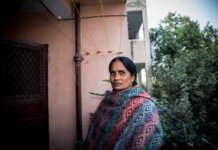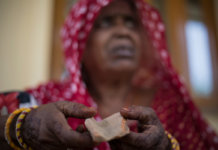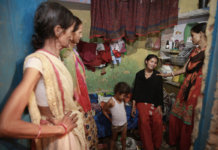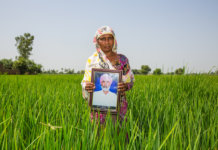A girl aged 17 is hailed as the elephant whisperer in India after they killed her father.
Nirmala Topno, from a village outside Rourkela, in eastern India, has been praised for being the only female in her area to handle as many as 17 wild elephants when they roam jungles and enter villages near her home.
Thanks to her father Marino, 50, from an early age she began following him and a group of local men whenever herds of wild elephants would roam populated areas.
People have witnessed her amazing ability to communicate with the animals and despite her tender age and tiny frame she pushes them to go back into the jungle.
But she became a celebrity in her country last year when she steered 11 wild elephants away on one occasion and a herd of 17 a couple of months later.
She said: ‘She said: ‘No woman in my area has ever dared to do what I do – never mind a girl my age. Because of my courage, people have started calling me the Elephant Whisperer. They believe that I have a certain power that makes elephants listen to me.’

But last November, Nirmala watched as a herd of elephants she was trying to push back into the wild attacked her father and killed him on the spot.
She refuses to let it beat her, and now the brave girl vows she will go on and work in the forest department when she finishes her studies at school.
‘‘I get nervous when I’m close to elephants, but once I succeed and do my job I feel extremely happy. I think I’m good at my job.’
While teenagers in UK go to the zoo to see elephants, Nirmala has grown up with the constant threat of wild herds running into her village and killing anything it their path.
No woman in my area has ever dared to do what I do – never mind a girl my age
Nirmala has watched her father go out with groups of men to push the elephants back into the jungle since she was a child.
She said: ‘My father used to watch people abandon their homes when elephants were close. They would let the huge animals run over their houses and destroy everything. But my father didn’t want to run from them forever, he didn’t want to keep rebuilding our home. So he decided to fight them.’
He gathered together a group of willing men and they soon began to get a name for themselves and were called upon whenever there were wild elephants close to villages.
When Nirmala was just 13 her father finally allowed her to accompany him and the group.
She said: ‘The first time I accompanied my father was after I begged him to take me with him. I’d wanted to go with him for years but he always told me I was too young. But he finally agreed. I felt a bit nervous but as soon as I saw the wild elephants, my fear vanished and I started to work.
‘After that whenever my father was asked to help I’d go too.’
Nirmala struggles to identify her special skills but she explained she somehow manages to convince the animals to leave by her tone of voice, body language, a flame torch and looking at the animals direct in the eye.
In August last year she even injured her foot while pushing a herd of elephants away from a cluster of homes. She was in hospital for weeks with a growing medical bill. But thankfully the government stepped in and paid her bills.
But three months later Nirmala and her father were called out again to help with a herd of wild elephants that had entered a field near a small village down the road and it was their last mission together as father and daughter.
Nirmala said: ‘I was in the school when the forest rangers called my dad asking for our help. Next minute the Principal came into class and said my family had called saying I was needed urgently,’ she said.
Nirmala travelled home as fast as she could where her father was waiting for her. He explained that a herd of 17 elephants had entered a nearby community and they were needed.
Nirmala added: ‘I changed my uniform; quickly grabbed some food and we took off. When we arrived they were in this huge field and the elephants were aggressive because locals had been pelting them with stones to make them leave.’
Nirmala and her father, who also worked as a daily labourer earning 5,000 Rupees a month (£50), quickly got to work. They split up trying to distract the elephants, encouraging them to move on.
Nirmala added: ‘Next minute I heard men shouting ‘a man is dying’. I ran over but I saw my father lying on the ground, a huge elephant over him. It was really angry but I stayed firm. I told it go, I stared at it and then it turned and ran.’
But when Nirmala got to her father, it was too late he was dead.
She said: ‘He wasn’t moving. I knew he was gone. I always prayed before going out to work with the elephants but God had a different plan that day.
‘I don’t hate elephants, but I do get sad when I think that my father died because of them. I just don’t underestimate their power.’

Nirmala and her family were given a cheque for two lakh (£2,000) as compensation for their loss and Nirmala’s mother Salomi, 40, was given a government job to help support her family.
But above all, out of respect for her father, Nirmala has been promised a job with the government’s forest department as a guard to protect animals from poachers when she leaves school.
‘I know they’ve given me this promise of a job because of who my father was and what we could do together. If he were still here there would be no job, so it’s hard for me to feel happy.
‘But if my father was alive today he would have been very proud of my work. He would’ve liked that his daughter was making a name for herself. He’d be very happy for me.’






















